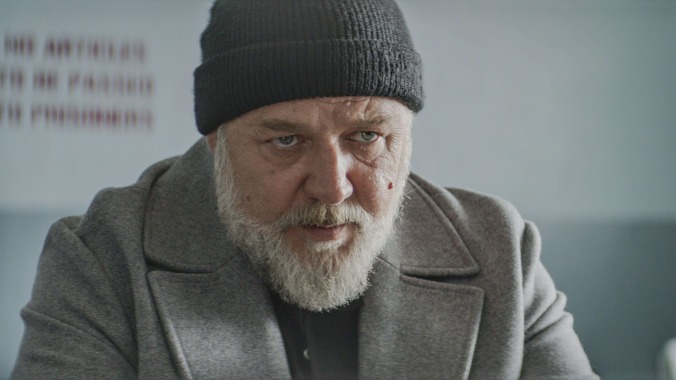Sleeping Dogs review: Russell Crowe forgets the plot, and so will you
Crowe commits to the role in a predictable amnesia noir mystery

It’s been 24 years since Christopher Nolan made a name for himself with his second feature Memento, so enough time has probably passed that heavily borrowing from it won’t be seen as a major crime. Sleeping Dogs doesn’t unfold in backward chronology, but covers similar territory plotwise: Russell Crowe’s amnesiac ex-cop Roy Freeman doesn’t go so far as to tattoo reminders of important details on his body, but he has labeled everything throughout his house with simple instructions for use, and makes sure to end the day putting his TV remote, or anything else he needs as badly, in places where he knows he’ll need to look for the basics.
Roy has Alzheimer’s, but also experimental electrodes in his head that just may help to mitigate or cure it. Essentially, this serves as a plot device so he can remember key details when the screenplay finds it convenient for him to do so. Otherwise, his mind operates more like a writer’s MacGuffin conception of Alzheimer’s than the disease itself, as he’s a fully functional human who can do everything he needs to. While most dementia patients lose their short-term memory first, however, he seems to keep reasonable track of the details he learns during the course of the story. Yet he recalls nothing of most of his life prior, or the people in it.
So when an organization dedicated to freeing innocent convicts contacts Roy, asking him to speak to a condemned death row inmate he helped put behind bars, it’s not as if he recalls any reason he shouldn’t. Urged by the accused to look deeper into the case, and by his doctor to keep his mind active, Roy begins to look into the possibly unsolved murder case he can’t remember. Now, note that the title of the movie, again, is Sleeping Dogs. If you can’t yet guess how it ends, you’re the target audience. Also, you might never have seen any whodunnit movies before in your life. It’s based on a novel called The Book Of Mirrors, so it’s not like that on-the-nose title was necessary.
As in the recent Land Of Bad, Crowe is quite capable of being compelling even when doing banal stuff—the highlight here is a variation on the “falling off the wagon” trope, as he captures the sheer delight of a guy who has literally forgotten how much he loves whiskey. The end point, like the movie’s, feels inevitable, but the journey there contains small joys.
So long as we’re with Crowe, that is. The story sidetracks as he reads a memoir and the movie becomes about someone else entirely. An arrogant young grad student named Richard Finn (Harry Greenwood) becomes obsessed with aspiring doctor Laura Baines (Karen Gillan), who may have been having an affair with her professor, Dr. Joseph Wieder (Marton Csokas), who also happens to be the victim in the murder case Roy is re-opening. Greenwood has something of a young Brad Dourif vibe to him, which makes him an insta-suspect by sheer typecasting, but he cannot compete with Crowe method-acting an amnesiac alcoholic with a massive headwound. In fairness, who could? This isn’t about fair, though—the novel only brought in Roy as a third-act protagonist, so Crowe is being given more to do than the source material would have it.
Sleeping Dogs marks the directorial debut of Adam Cooper, who co-scripted with his usual writing partner Bill Collage—the two previously wrote the Assassin’s Creed movie, the Jason Statham-less The Transporter Refueled, and Ridley Scott’s Exodus: Gods And Kings. An unkind soul might suggest that inferior adaptations are their stock in trade. Cooper at least has a good eye, remembering that film noir and its derivations are so named for their literal darkness and shadows as well as their themes. So long as the story follows Roy, it’s all dark corners and headache-simulating contrasts. The extended Richard Finn flashback is more conventionally shot, while Roy’s electrode-induced, last-minute flashbacks depict a convincingly de-aged Crowe in warmer lighting.
There is an extended red herring subplot that makes one briefly think the movie’s going to be smarter than it is—no spoilers here, but with such an on-the-nose title, the film’s best tactic is to try to swerve you in another direction, and it works for a little while. Tommy Flanagan greatly aids this particular digression, at least initially, as Roy’s old partner who’s pretty obviously hiding something. Karen Gillan, as wonderful as she has been in so many other films, is saddled with a clunky script that never allows her to fully inhabit her femme fatale role. Playing the originally accused, Pacharo Mzembe makes a powerful first impression, only to be jettisoned almost entirely from the story the moment Roy looks deeper.
For Crowe completionists, this may not disappoint—he clearly worked for his money on this one. Here’s hoping he got a decent amount, because for most viewers, it’s likely to fade from memory as rapidly as his character’s pre-surgical life.